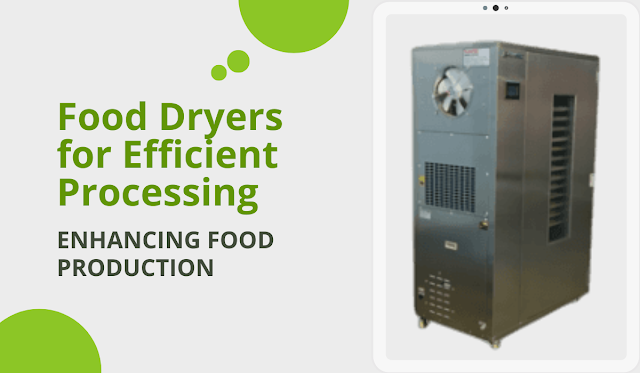Enhancing Food Production: Food Dryers for Efficient Processing
Introduction
In a world driven by growing populations and changing consumer preferences, the food industry constantly seeks innovative ways to meet demands while maintaining quality and efficiency. Industrial food dryers have emerged as a crucial technology in enhancing food production processes. These powerful machines offer a reliable solution for preserving food, reducing waste, and maximizing shelf life. In this blog, we delve into the realm of food dryers, exploring their significance in modern food processing and their role in revolutionizing the industry.
The Need for Efficient Food Processing
Efficient food processing is at the core of meeting the world's increasing demand for sustenance. Traditional methods of food preservation, such as canning and freezing, have their limitations. They can alter the taste, texture, and nutritional content of food. Moreover, these methods often require significant energy consumption, contributing to environmental concerns.
Food dryers address these challenges by providing an efficient means of removing moisture from food products while retaining their essential nutrients, flavors, and qualities. By doing so, they extend the shelf life of food, reduce waste, and create new opportunities for food innovation.
Food Dryers: A Technological Marvel
Food dryers are sophisticated machines designed to remove moisture from various food products through controlled heating and air circulation. The process involves placing the food inside the dryer and circulating hot air over it. As the hot air evaporates the moisture, the food gradually dries and retains its desired characteristics.
These dryers come in various sizes and configurations to accommodate different types of food products, from fruits and vegetables to meat, grains, and herbs. Depending on the specific requirements of the product, manufacturers can choose from different drying methods such as convection drying, freeze-drying, or vacuum drying.
Significance of Food Dryers
Preservation of Nutrients: One of the significant advantages of food dryers is that they help retain the nutritional value of the food. By operating at lower temperatures compared to traditional preservation methods, they ensure that vital vitamins, minerals, and enzymes remain intact.
Extended Shelf Life: Removing moisture prevents the growth of bacteria, mold, and other microorganisms that cause spoilage. This results in a significantly extended shelf life for food products, reducing food waste and increasing profitability.
Consistency and Quality: Food dryers ensure uniform drying throughout the product, preventing inconsistencies in texture and taste. This uniformity leads to higher-quality end products, which can be essential in maintaining consumer satisfaction.
Energy Efficiency: While drying is an energy-intensive process, modern food dryers are designed to be energy-efficient. Advanced technology and precise control systems help optimize energy consumption and reduce operational costs.
Diverse Applications: These dryers cater to a wide range of food products, enabling food manufacturers to diversify their offerings. From creating dehydrated snacks to powdered ingredients for soups and sauces, the possibilities are vast.
Reduced Footprint: As compared to traditional preservation methods that may require large storage spaces and energy-intensive refrigeration, food dryers require less physical space and often have a smaller environmental footprint.
Market Demand: The rise in demand for convenience foods, snacks, and ingredients for the food service industry has increased the need for efficient drying solutions. Food dryers help meet these demands while maintaining product quality.
Future Trends and Innovation
As technology advances, so do food dryers. Emerging trends in this field include the integration of smart technology and automation. IoT-enabled dryers can monitor and control drying processes remotely, ensuring optimal conditions and reducing human intervention. Additionally, advancements in renewable energy sources are likely to influence the design of energy-efficient dryers, further minimizing their environmental impact.
Conclusion
In a world where food security, sustainability, and efficiency are paramount, food dryers have emerged as a vital asset in the food processing industry. They bridge the gap between traditional preservation methods and modern demands for high-quality, convenient, and nutritious food products. By effectively removing moisture from a variety of food items, these dryers extend shelf life, preserve nutrients, and reduce waste. As technology continues to evolve, food dryers are set to play an increasingly significant role in enhancing food production and shaping the future of the global food industry.




Comments